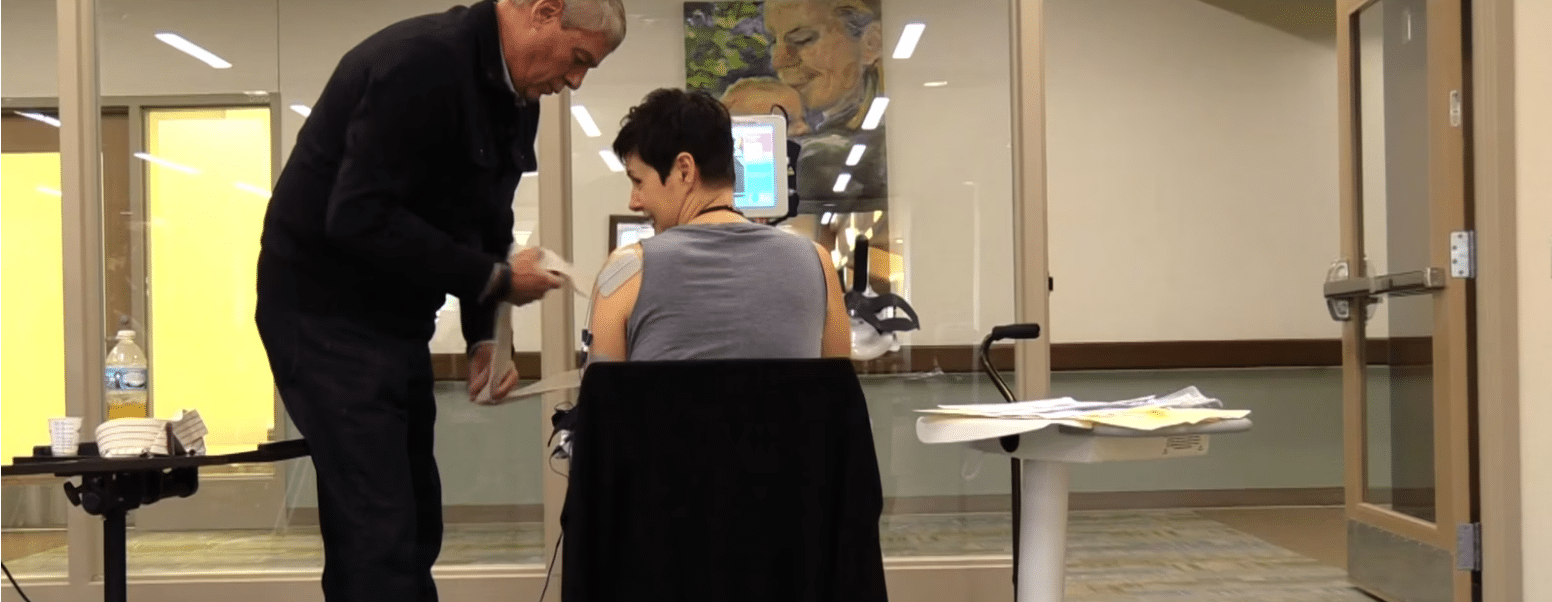Support groups are not a new concept. In May 2016, Madonna’s Lincoln Campus Stroke Support Group marked its 10-year anniversary.
Now, that opportunity for connecting with others has expanded to Madonna’s Omaha Campus as part of a collaboration with Nebraska Medicine and the Brain Aneurysm Foundation.
Stroke survivor Shannon Belk and her husband, Mark, shared why support groups are such an important part of their journey of recovery.
“Hello, my name is Shannon Belk and I’ve been a stroke survivor for eight years.”
“Hi, my name is Mark Belk. I’m Shannon’s caregiver. I’m her husband first and her caregiver second.”
Once a week, Shannon and Mark visit Madonna’s Omaha Campus to spend time working with the RT300 Functional Electrical Simulation, or FES, Cycle.
“It’s been eight years since I felt my arm flex, and it gets it into a flexed state and that’s pretty cool,” said Shannon.
The device uses electrical impulses to stimulate the nerves connected to the muscles in her left arm where she hopes to regain movement.
“For eight years, I’ve been coming to therapy twice a week every week, just trying to regain mobility,” she said.
All the while, Shannon and Mark have made connections with other stroke survivors through different support groups.
“Stroke support group is so great because of the amount of empathy that you get. You’re surrounded with people who truly understand what you’re going through. And it’s not sympathy, it’s true empathy,” explained Shannon.
“It’s an opportunity for caregivers to talk to each other about things that work. Things they’ve tried that sometimes don’t work. How do you do a lot of transfers? How do you work on getting in and out of the hospital for rehab work? What do you do when the weather is cold? What do you do when there’s ice or snow?” added Mark. “Just the whole day-to-day living process is shared on what people do and it helps caregivers tell their story and it gives other caregivers ideas of things that they can do as well.”
That’s the goal of Madonna’s new stroke support group for the Omaha Campus, in collaboration with Nebraska Medicine and the Brain Aneurysm Foundation.
“We just want to connect stroke survivors and caregivers together. We want to provide educational opportunities for them, social opportunities and just that chance to see I’m not alone in my recovery,” said Kasia Richardson, a speech-language pathologist and the Omaha Campus Stroke Program Leader.
It’s an opportunity to share experiences.
“With our stroke survivors that are a few days or few weeks post stroke, seeing our patients or stroke survivors and caregivers that are years post stroke, potentially, and that they can keep that hope,” said Kasia.
It’s also an opportunity to raise awareness.
“What I ask of the public is for those of us, no matter if you’re a stroke survivor or how you came to be disabled, being out in the community takes a lot of courage. Because we don’t mean to hold people up. We know we’re slow. And I just ask for people to show some love, extra love, extra space, extra time,” added Shannon.
And to share hope.
“Recovery may take time, but every day could be better, so I would just say, stick with it. Don’t give up and keep trying,” said Mark.
The new stroke support group, called Nebraska’s Hope for a Better Tomorrow, will meet the 2nd Tuesday of each month at both Nebraska Medicine and Madonna Rehabilitation Hospitals-Omaha Campus (Please use the main entrance on the east side of the building).
6 to 6:30 p.m. – Welcome and dinner
6:30 to 7 p.m. Education topic and speaker
7 p.m. to 7:30 Support and sharing social time
To learn more about Madonna’s support groups and peer support, click here.






